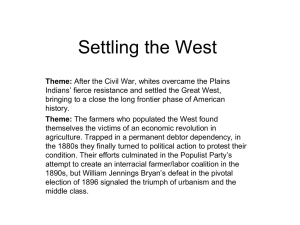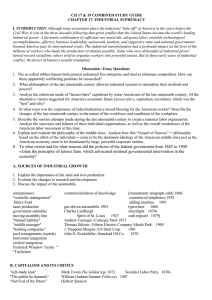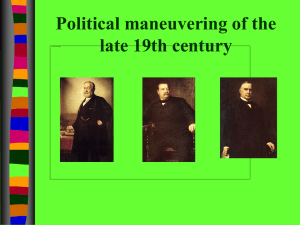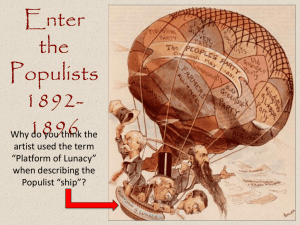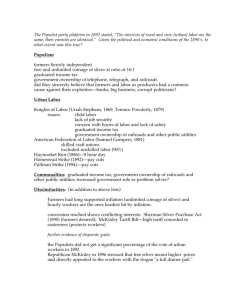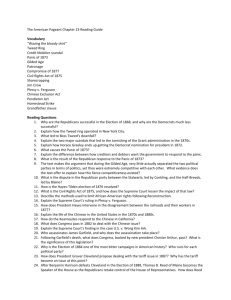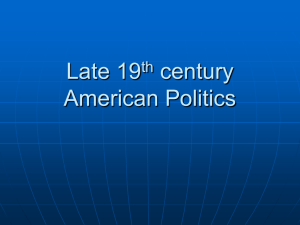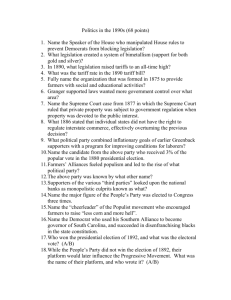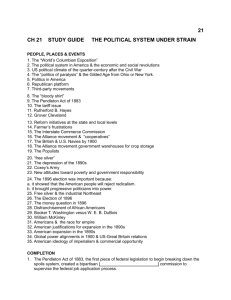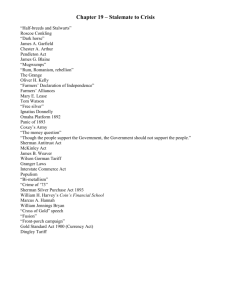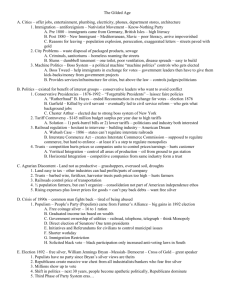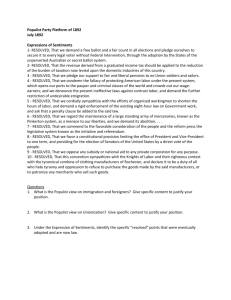Ch 19 Study Guide
advertisement
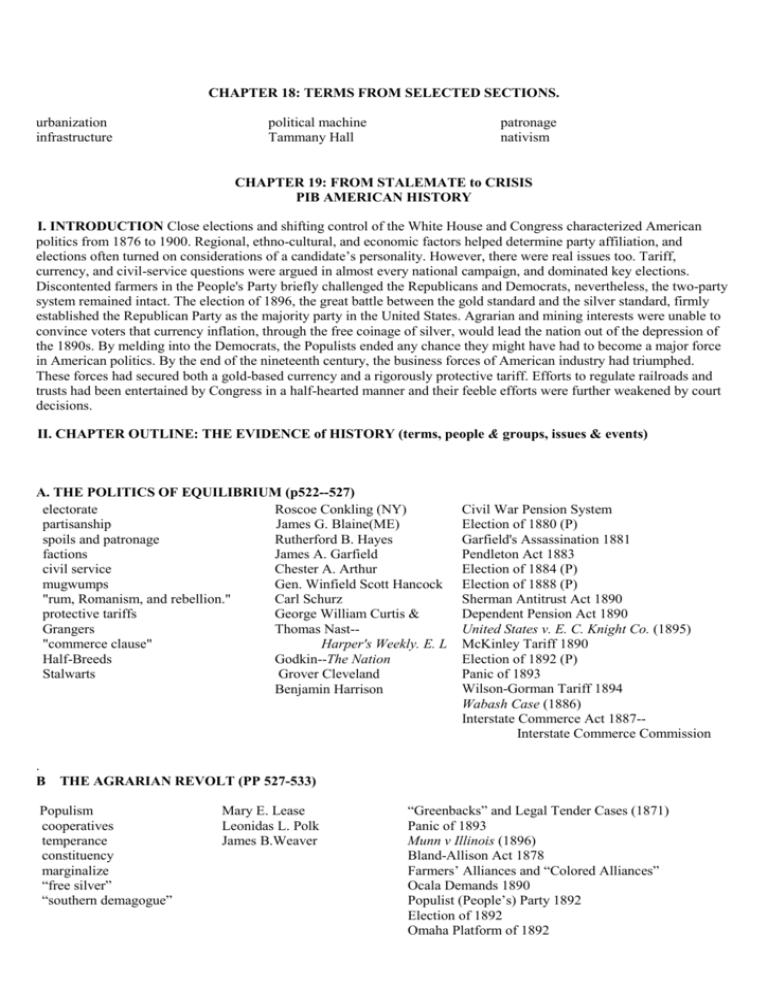
CHAPTER 18: TERMS FROM SELECTED SECTIONS. urbanization infrastructure political machine Tammany Hall patronage nativism CHAPTER 19: FROM STALEMATE to CRISIS PIB AMERICAN HISTORY I. INTRODUCTION Close elections and shifting control of the White House and Congress characterized American politics from 1876 to 1900. Regional, ethno-cultural, and economic factors helped determine party affiliation, and elections often turned on considerations of a candidate’s personality. However, there were real issues too. Tariff, currency, and civil-service questions were argued in almost every national campaign, and dominated key elections. Discontented farmers in the People's Party briefly challenged the Republicans and Democrats, nevertheless, the two-party system remained intact. The election of 1896, the great battle between the gold standard and the silver standard, firmly established the Republican Party as the majority party in the United States. Agrarian and mining interests were unable to convince voters that currency inflation, through the free coinage of silver, would lead the nation out of the depression of the 1890s. By melding into the Democrats, the Populists ended any chance they might have had to become a major force in American politics. By the end of the nineteenth century, the business forces of American industry had triumphed. These forces had secured both a gold-based currency and a rigorously protective tariff. Efforts to regulate railroads and trusts had been entertained by Congress in a half-hearted manner and their feeble efforts were further weakened by court decisions. II. CHAPTER OUTLINE: THE EVIDENCE of HISTORY (terms, people & groups, issues & events) A. THE POLITICS OF EQUILIBRIUM (p522--527) electorate Roscoe Conkling (NY) partisanship James G. Blaine(ME) spoils and patronage Rutherford B. Hayes factions James A. Garfield civil service Chester A. Arthur mugwumps Gen. Winfield Scott Hancock "rum, Romanism, and rebellion." Carl Schurz protective tariffs George William Curtis & Grangers Thomas Nast-"commerce clause" Harper's Weekly. E. L Half-Breeds Godkin--The Nation Stalwarts Grover Cleveland Benjamin Harrison . B Civil War Pension System Election of 1880 (P) Garfield's Assassination 1881 Pendleton Act 1883 Election of 1884 (P) Election of 1888 (P) Sherman Antitrust Act 1890 Dependent Pension Act 1890 United States v. E. C. Knight Co. (1895) McKinley Tariff 1890 Election of 1892 (P) Panic of 1893 Wilson-Gorman Tariff 1894 Wabash Case (1886) Interstate Commerce Act 1887-Interstate Commerce Commission THE AGRARIAN REVOLT (PP 527-533) Populism cooperatives temperance constituency marginalize “free silver” “southern demagogue” Mary E. Lease Leonidas L. Polk James B.Weaver “Greenbacks” and Legal Tender Cases (1871) Panic of 1893 Munn v Illinois (1896) Bland-Allison Act 1878 Farmers’ Alliances and “Colored Alliances” Ocala Demands 1890 Populist (People’s) Party 1892 Election of 1892 Omaha Platform of 1892 PATTERNS OF POPULAR CULTURE: THE CHAUTAUQUAS (pp 530--531) C. THE CRISIS OF THE 1890s (pp542-547) Contraction of credit Jacob Coxey Bankruptcy William H. Harvey Inflation Coin’s Financial School 1894 Specie Bimetallism Panic of 1893 Coxey’s Army (1894) “Crime of 73”—Coinage Act of 1873 Sherman Silver Purchase Act of 1890 Repeal of Sherman Silver Purchase Act 1893 POPULISM (PP 534-535) D. "A CROSS OF GOLD" (pp547-549) "...you shall not crucify mankind upon a cross of gold." "whistlestop campaign" "front-porch" campaign" "battle of the standards" Marcus Hanna William McKinley William Jennings Bryan "Cross of Gold" speech 1896 The Great Commoner" Election of 1896 (P) Dingley Tariff 1897 Gold Standard (Currency) Act 1900 E. CONCLUSION (p550) III. ADDITIONAL READINGS: Shi, David E. and Holly A. Mayer. For The Record. A Documentary History of America. Volume Two. W. W. Norton, Inc., 1999. Harper: Cleveland: Omaha Morning World-Herald: Lease: McDonald-Valesh: A Black Woman's Appeal for Civil Rights (1891) p93/95 Veto of Pension Legislation (1886) p96/97 Populist Party Platform (1892) p98 The Money Question (1892) p101 The Strength and Weakness of the People's Movement (1892) p102 Morion: U of Illinois: Bryan: What Farm Problem? (1896) Republican Party Platform of 1896 from The "Cross of Gold" Speech (1896) p104 p105 p106 Constructed Response Questions 1) Compare and contrast the three different stages of the agrarian revolt that developed between the 1860s and 1890s. Describe how the movement became more and more political. 2) Discuss the causes and the effects of the Panic of 1893. 3) Compare and contrast the political philosophies and the campaign styles of the two major candidates for president in 1896. 4) Describe and analyze the rapid rise and fall of the Populist Party. Discuss the Party’s platform in the context of the 1890s.
